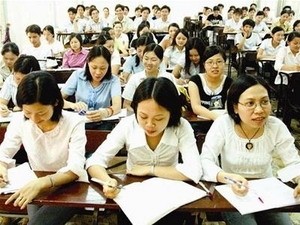NA deputies discuss draft Law on Tertiary Education
Ngoc Anh -
 |
|
(VOVworld) – National Assembly deputies today discussed in group the draft Law on Tertiary Education after previously collecting opinions from educational experts, scientists, teachers, and administrators. Once the law is completed, it will be used to reform the country’s education sector. The right of self-determination and social responsibilities of tertiary schools are the core of the draft law. Dam Thi My Huong, a deputy from Ninh Thuan province, says ‘I agree with the assessment of the National Assembly Standing Committee that a University Council should be an integral part of any tertiary school. The establishment of such a council concedes the right of self-determination to the school. This will help our higher education system operate more responsibly. But to make the council run efficiently, I think the Ministry of Education and Training should outline regulations for its organization, defining the authority and interests of every individual in the council. The regulations should also cover inspections, monitoring, and dealing with violations’.
Specific regulations were proposed on criteria and standards for classifying tertiary schools and a framework for Government ranking of universities. Investment plans and state management mechanisms would be based on this ranking. Many deputies say a regional university and a national university need different investment and management policies. Deputies opposed renaming national universities, as that names have become their brands. Many deputies agreed the education sector should be socialized, but called for clearer definitions. For example, what is a for-profit tertiary school and what is a not-for-profit school? A private tertiary school should set aside at least 25% of its profit to re-invest in its education and training or charity activities.
A majority of participants agreed on regulations for auditing the quality of higher education and publicizing the results, but details of implementation still need to be worked out.
Ngoc Anh